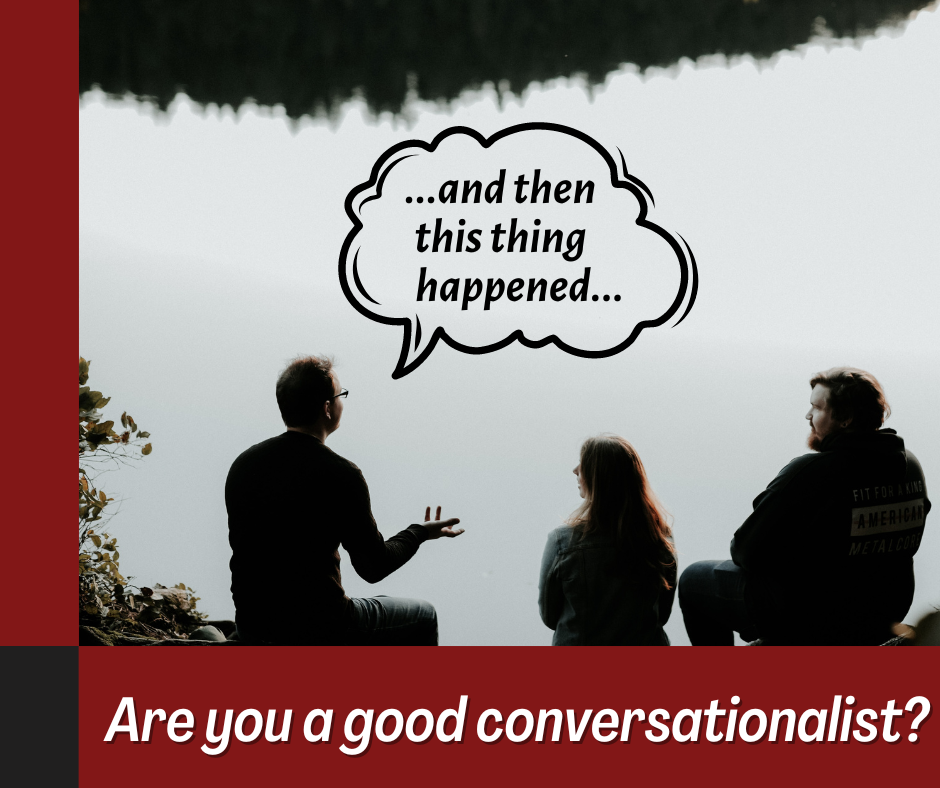
I learned a valuable lesson years ago at a beach bonfire party for my work. My boyfriend at the time came with me, and on the ride to the event we talked about Dale Carnegie’s book, How to Win Friends and Influence People. He decided to try out one of the primary suggestions from the book: Asking questions to find out what someone cares about, and then genuinely asking follow-up questions to really understand their views, passions, and ideas.
Did it work? Yes. Brilliantly.
There were only 10 people at the party, and two of the attendees went out of their way to tell me how much they enjoyed talking to my boyfriend, and specifically said that he was a great conversationalist. What they really meant, though, was that he showed ongoing genuine interest in what mattered to them and let them talk about themselves. And they felt really good about the conversation.
Although my boyfriend was happy that they enjoyed talking to him, he didn’t love how one-sided the conversations were, because the other people didn’t ask him questions or show interest in what mattered to him. But we both learned a valuable lesson about how to make another human feel important, interesting, and heard. And we also learned how to be perceived as a good conversationist.
Were you ever taught how to be a good conversationist?
Did anyone ever model for you how to ask meaningful questions and listen with the intent to understand?
Being a good conversationalist is a skill set. One of the core qualities is curiosity for the sake of getting to know and learn from another human. Two of the main skills within this are asking meaningful questions and listening.
As humans, it feels good to be seen and known by another. When someone wants to hear us talk about what matters to us, we feel deeply validated and worthy.
Unfortunately, this is likely the same reason why many people are unskilled at asking detailed questions and listening intently – unskilled at being good conversationalists – because they want to talk about what matters to them. They want to feel validated and worthy, without realizing that we ALL want to feel that way.
I don’t think most people do this intentionally. I think they are just unaware.
Ideally, when two people come together for a conversation, BOTH people are asking questions and showing interest. However, as we all know, that is often not the case. I’ve come to categorize people’s ability or awareness in asking questions into four categories. Reflect on your experiences with people who:
1. Ask no questions. This person truly just wants to talk about themselves or talk about what they know, and they believe they are interesting and that others want to hear what they have to say. If you are talking, they are often not fully listening because they are thinking about what they want to say next and may interrupt you. Other times it seems they simply wait for a pause in your speaking to start their own story or share their “knowledge,” regardless of what you just said.
2. Ask superficial questions. This person asks the generic “How was your day?” or “What’s new for you?”, but then quickly pulls the conversation back to themselves and dominates the talking. They are the same as #1 but do pause occasionally to ask you a general question.
3. Ask more detailed questions…but only that are relevant to them. This kind of person threw me for a loop at first, especially in the dating world. They ask questions about things you’ve done or your views on topics, but only because those topics matter to them or impact them. For example, someone asks you about whether you’ve been to Italy, but not because they want to hear about your travels, but because they want an opening to talk about their trip to Italy. And if you do share about your trip, they only half-listen until they can jump back in and talk about their experiences or knowledge.
4. Ask detailed questions and follow-up questions…and are genuinely curious and listening. This person genuinely wants to know about the things that matter to you, what you learned through specific experiences in life, and why you are so passionate about a specific topic or activity. They ask in-depth follow-up questions, going deeper for a better understanding of you and the topic. When they have a similar story or experience, they either throw it into the conversation in passing or wait until you’ve shared your story to mention it.
Different settings obviously warrant different conversational approaches. If you’re stuck in an airplane seat next to a #1 or #2, it may not be in your best self-interest to ask many questions, unless your iPad battery is dead, you forgot your book, or the person has knowledge or experiences that are particularly interesting to you.
In contrast, there are times when visiting with an old friend or out drinking with a lively group that your conversational banter is fast, with enthusiastic interruptions and storytelling. As well, I’ve certainly had interactions with a person who is an expert in their field, who has impressive achievements, or a life story so different than my own, that I just want to ask questions and learn about them and from them.
Nonetheless, overall, the ideal is for both people to be present, listening, and asking questions to learn more.
If you want to up your game around question asking, here are some prompts to start. All of these can be followed with a series of specific “whys” to dive deeper:
1. What was a highlight for you this week? How did it make you feel?
2. What does that mean to you?
3. What’s something you’re most passionate about?
4. What’s one thing you learned from that experience?
5. What has been a challenge for you recently?
6. What’s something fun you’ve done recently?
7. What’s something you’re looking forward to this summer/fall/winter/spring?
8. You seem to really enjoy this – I’d love to hear why?
9. Who inspires you?
Your intent is not to be fake or play a game, but to view the fellow human in front of you as someone worthy of your time, respect, and listening. It takes patience, mindfulness, curiosity, and caring to engage with another human in this way. It also requires the humility to realize that what you have to say isn’t the most important thing. This may require retraining your brain and your emotional awareness, but it’s truly a gift to hear, see, and understand another human in this way.
~Dr. Jenn Gunsaullus — Sociologist, Intimacy Speaker, & Communication Coach

